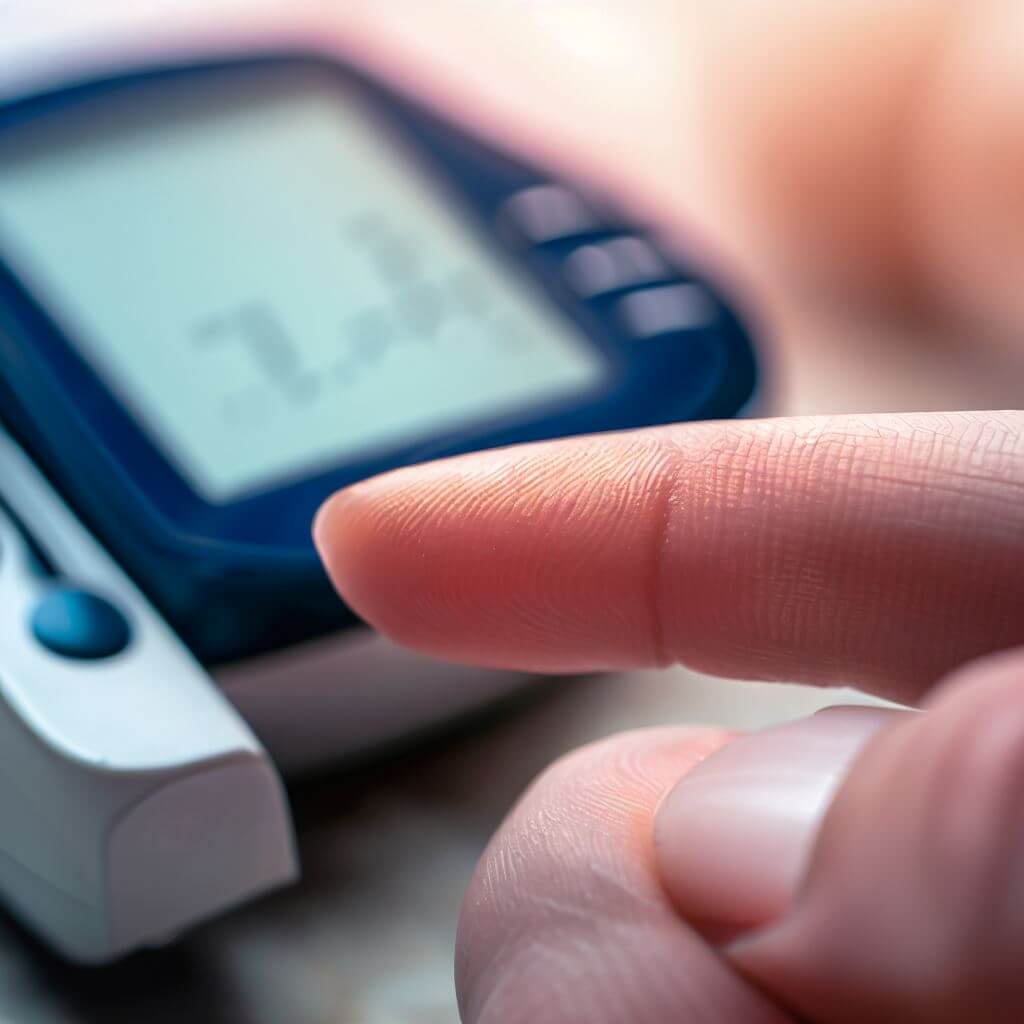Understanding the Basics: A Guide to High Blood Sugar and Its Triggers
Starting on the path of managing your high blood sugar means first getting to grips with what exactly it is, how it manifests, and why it’s important to keep it under control. This is especially crucial for those already dealing with diabetes, but it’s also vital information for anyone interested in leading a healthier lifestyle. In this introductory section, we’ll lay the foundation for the rest of the article, preparing you to dive deeper into the subject matter. Let’s dive in to High Blood Sugar Triggers!
Decoding High Blood Sugar: What Does It Really Mean?
Understanding what high blood sugar is requires a multi-layered approach. Let’s break it down.

Definition: The Scientific Angle
High blood sugar, clinically known as hyperglycemia, is a condition where there is an excess of glucose present in the bloodstream. Normally, insulin — a hormone produced by the pancreas — helps to regulate this glucose. It ensures that the sugar is transported into the cells for energy. However, when your body can’t produce enough insulin or becomes resistant to its effects, the glucose stays in the bloodstream, leading to high blood sugar.
It sounds like a lot of scientific jargon, doesn’t it? But understanding these basic principles can be the key to unlocking better health. The point is, you want to aim for balanced blood sugar levels to avoid a myriad of health issues.
Symptoms: Know the Signs
Recognizing the symptoms of high blood sugar can sometimes be tricky because they can be subtle and gradual. However, there are some signs to watch for:
- Frequent Urination: You may find yourself going to the bathroom more often than usual.
- Thirst and Hunger: An unusual increase in thirst and hunger can also signal high blood sugar.
- Fatigue: Feeling constantly tired or having low energy is another indicator.
- Blurred Vision: Changes in your eyesight, such as blurred vision, can occur.
- Headaches: Persistent headaches should not be ignored.
If you’re experiencing these symptoms, especially more than one of them, it’s advisable to seek medical attention as soon as possible.
Consequences of Unmanaged High Blood Sugar: The Long Game
Ignoring high blood sugar can be perilous. While you might not feel the negative impact immediately, long-term consequences can be severe. These include but are not limited to:
- Nerve Damage: Elevated blood sugar levels can affect the nerves in your body, leading to tingling sensations or numbness, most commonly in the feet and hands.
- Kidney Failure: The kidneys work harder when blood sugar levels are high, and over time, they can become damaged.
- Cardiovascular Diseases: Heart issues, including the risk of heart attack and stroke, are significantly increased.
- Vision Problems: The eyes are incredibly sensitive to high blood sugar, which can result in conditions like diabetic retinopathy.
Deciphering the Digits: What Blood Sugar Numbers Actually Mean
Understanding what those numbers on your glucose meter signify is paramount to managing your blood sugar effectively. Not only do they provide a snapshot of your current condition, but they also help guide your actions to improve your health.
Normal Ranges: What’s Considered Healthy?
According to the American Diabetes Association (ADA), the generally accepted ranges for blood sugar levels are as follows:
- Fasting Blood Sugar: Between 70-99 mg/dL is considered normal.
- Post-meal (1-2 hours after eating): A level below 140 mg/dL is typically within a normal range.
Pre-Diabetic and Diabetic Zones: Cause for Concern
- Fasting Blood Sugar: A fasting blood sugar level between 100 mg/dL to 125 mg/dL is considered pre-diabetic, while 126 mg/dL and above is categorized as diabetic.
- Post-meal (1-2 hours after eating): A level between 140 mg/dL to 199 mg/dL post-meal is pre-diabetic, while 200 mg/dL and above is diabetic.
The Danger Zone: When to Seek Immediate Medical Attention
A blood sugar level above 240 mg/dL is dangerous and requires immediate medical attention. At this point, you’re at risk of severe complications such as diabetic ketoacidosis, which can be life-threatening.
Remember, these are general guidelines. Always consult your healthcare provider for advice tailored specifically to your condition.
Identifying the Culprits: Common Triggers of High Blood Sugar
While the exact triggers can vary from person to person due to unique metabolic responses, certain factors universally contribute to elevated blood sugar levels. These include:
Diet
Your eating habits play a massive role in blood sugar management. Foods high in carbohydrates and sugars are the most significant dietary triggers.
Lack of Exercise
A sedentary lifestyle inhibits the body’s ability to regulate blood sugar effectively. Physical activity helps burn excess sugar and makes your cells more responsive to insulin.
Stress
High stress levels can trigger hormone changes that lead to a temporary spike in blood sugar levels.
Medication
Certain medicines like steroids can elevate your blood sugar levels. If you’re on medication, it’s advisable to consult your healthcare provider to discuss any potential impacts on your blood sugar.
Illness
Sickness often stresses the body, leading to higher sugar levels. Even a common cold can disrupt your blood sugar balance.
Food Alert: Dietary Triggers that Skyrocket Blood Sugar
Understanding the impact of food on your blood sugar levels can make all the difference in managing it effectively. Here’s a closer look at what to avoid:
Sugary Beverages
Drinks like soda, fruit juice, and other sugary beverages can cause an immediate and significant spike in your blood sugar.
Processed Foods
Packaged foods, even those labeled “healthy,” often contain hidden sugars and high levels of carbohydrates. Always read labels carefully.
High-Glycemic Index Foods
Foods like white bread, potatoes, and white rice have a high glycemic index, meaning they’re rapidly converted into sugar in your body.
Snacks and Desserts
Chips, cookies, and other snacks often contain not just high amounts of sugar but also fats that can disrupt your blood sugar levels.
Large Portions
Even healthy food can trigger high blood sugar if consumed in excessive amounts. Portion control is key.
The food you consume directly impacts your blood sugar levels. By knowing which foods to avoid or consume in moderation, you can take a proactive step in maintaining a healthier lifestyle.
The Perils of Couch Potato Syndrome: Lack of Physical Exercise
In a world where sedentary lifestyles are increasingly common, it’s essential to discuss the role of physical inactivity in elevating blood sugar levels. What happens when you skip those workouts? Let’s dig in.
Insulin Sensitivity and Exercise: A Crucial Connection
Exercise increases the cells’ sensitivity to insulin, facilitating more efficient glucose uptake from the bloodstream. This is a significant factor in blood sugar management. Without regular exercise, your cells can become less responsive to insulin, leaving more sugar in your bloodstream.
The Role of Muscle Mass
Did you know that muscle tissues consume more glucose than fat tissues? This means the more muscle mass you have, the better your body becomes at regulating blood sugar levels. Regular strength training can significantly contribute to better blood sugar management.
What Types of Exercise Help?
- Aerobic Exercises: Activities like walking, running, swimming, and cycling can be especially beneficial in lowering blood sugar levels.
- Strength Training: Exercises that build muscle mass, like weightlifting, also contribute positively.
- Flexibility Workouts: Yoga and stretching, while not as impactful as aerobic and strength training, still offer some benefits.
The key takeaway here is that incorporating exercise into your routine doesn’t just keep you fit; it also aids in blood sugar regulation, providing a multi-faceted approach to managing high levels.

Stress as a Blood Sugar Trigger
We’ve all heard the adage that stress kills, but how does it specifically affect your blood sugar levels?
The Cortisol Connection
When you’re stressed, your body releases stress hormones like cortisol. This hormone triggers a release of glucose into the bloodstream, providing the body with a quick energy source. While this mechanism is designed for survival, it negatively impacts those with existing blood sugar issues by causing a spike in their levels.
The Emotional Aspect
Stress also influences emotional well-being, which in turn can lead to poor eating choices and sedentary behavior. Ever heard of stress-eating? That’s the emotional aspect wreaking havoc on your blood sugar.
Managing Stress for Blood Sugar Control
Effective stress management techniques include:
- Mindfulness and Meditation: These practices have shown promise in reducing stress and, by extension, blood sugar levels.
- Regular Exercise: Another reason to hit that gym or take a jog.
- Healthy Coping Mechanisms: Learning to cope with stress in a healthy way, such as talking to a friend or engaging in a hobby, can go a long way.
Prescription Pitfalls: Medication and Other Factors
Steroids and Blood Sugar
Some medications like corticosteroids can disrupt blood sugar levels. They interfere with how your body metabolizes sugar and can lead to short-term spikes or long-term elevation if used extensively.
Other Medications
Blood pressure medications, antipsychotic drugs, and certain hormonal therapies may also impact your blood sugar levels. It’s always advisable to consult with your healthcare provider if you notice changes after starting a new medication.
Additional Factors
- Infection and Illness: As mentioned earlier, sickness can elevate blood sugar levels, but it’s often temporary. Monitoring is crucial during these times.
- Menstrual Cycle: Hormonal changes during the menstrual cycle can affect blood sugar levels in some women.
The Watchtower: Monitoring and Management of High Blood Sugar
You can’t manage what you don’t measure. Monitoring your blood sugar levels is a cornerstone of effective diabetes and high blood sugar management. But how do you go about it? And what strategies can you employ to keep your levels in check? Let’s take a closer look.
Methods of Monitoring
- Blood Glucose Meters: These handheld devices provide immediate readings and are the most common method for regular blood sugar monitoring.
- Continuous Glucose Monitors (CGMs): These wearable devices offer real-time glucose monitoring, providing a more comprehensive view of your blood sugar trends.
Key Times to Monitor
- Fasting Blood Sugar: This should be done first thing in the morning before you consume any food or drink.
- Postprandial: Measuring your blood sugar about two hours after a meal can indicate how your body is responding to food.
- Random Checks: Occasionally checking at random times can provide valuable insight into your blood sugar trends.
Adjusting Your Game Plan
Once you have a good grasp of your blood sugar levels, the next step is managing them. Here are some strategies:
- Dietary Changes: Cut down on foods and drinks that trigger high blood sugar.
- Physical Activity: Incorporate exercise into your routine to increase insulin sensitivity.
- Medication: Medications like Metformin can help regulate blood sugar levels. Always consult your healthcare provider for tailored advice.

The Power of Teamwork: Community and Professional Support
When it comes to managing high blood sugar, don’t underestimate the power of a strong support system. Whether it’s friends and family or professionals in the healthcare sector, having people who understand your challenges can make a world of difference.
Support Groups
- Community Groups: Local or online forums where people share their experiences, tips, and challenges can provide a sense of belonging and a wealth of information.
- Family and Friends: Emotional and even logistical support from your closest circle can be invaluable. Sometimes, a simple reminder to check your blood sugar or an encouraging word can go a long way.
Professional Help
- Primary Care Physician: Regular check-ups with a trusted doctor can provide a solid foundation for your management plan.
- Endocrinologist: These specialists focus on hormonal imbalances, including insulin, and can offer in-depth insight into your condition.
- Nutritionist/Dietician: A qualified diet expert can help you come up with a meal plan tailored to your specific needs.
Leveraging Technology
Today, numerous apps and software are available to help you keep track of your blood sugar, diet, and exercise. Use technology to your advantage to simplify the management process.
Pros and Cons of Different Management Strategies
Managing high blood sugar involves multiple approaches, each with its unique set of benefits and drawbacks. Let’s examine some popular strategies to see what suits you best.

Dietary Changes
Pros:
- Immediate Impact: Dietary changes can have a quick and noticeable effect on blood sugar levels.
- No Side Effects: Unlike medications, food doesn’t have an ingredient list of potential side effects.
Cons:
- Requires Discipline: It can be hard to break old eating habits.
- Limited Choices: May feel restrictive, especially at social gatherings.
Physical Activity
Pros:
- Long-term Benefits: Regular exercise can provide lasting changes in blood sugar management.
- Improves Overall Health: Beyond blood sugar, exercise has numerous other health benefits like improving cardiovascular health.
Cons:
- Time-Consuming: Finding the time can be difficult for busy individuals.
- Physical Limitations: Not everyone can perform every type of exercise due to age, injury, or other health issues.
Medication
Pros:
- Effective: Medically proven to lower blood sugar levels.
- Quick Action: Some medications can act fast to reduce high blood sugar.
Cons:
- Side Effects: Medications can have adverse effects, ranging from mild to severe.
- Cost: Some medicines can be expensive and may not be covered by insurance.
Actionable Takeaways for Managing High Blood Sugar Triggers
Managing high blood sugar doesn’t have to be a Herculean task. Here are some simple, actionable takeaways to get you started:
- Check Your Levels: Regularly monitor your blood sugar to understand how different factors affect you.
- Get Moving: Aim for at least 150 minutes of moderate-intensity exercise per week.
- Be Food-Smart: Limit the intake of processed foods and sugary beverages.
- Manage Stress: Engage in stress-reducing activities like mindfulness or deep-breathing exercises.
- Consult Professionals: Don’t underestimate the value of expert advice. Visit your healthcare provider for personalized guidance.
Navigating the Maze of High Blood Sugar Triggers Management
High blood sugar management may seem overwhelming at first, but understanding its triggers and effective monitoring can help you regain control. By weighing the pros and cons of different strategies, you can tailor a management plan that’s right for you.
FAQs
1. What’s the best time to check blood sugar levels? The best times are fasting (early morning before food) and postprandial (1-2 hours after meals). However, your healthcare provider might recommend additional times based on your condition.
2. How can I make dietary changes more manageable? Start small. Swap out one unhealthy item for a healthier alternative each week. Gradually, your tastes and preferences will adjust.
3. What if I can’t engage in intense exercise? Light activities like walking, gardening, or doing household chores can still help manage blood sugar levels. Consult your healthcare provider for a suitable exercise regimen.
4. How can technology help in managing high blood sugar? There are several apps available that track your food intake, exercise, and blood sugar levels. Some can even send reminders or share data with your healthcare provider.
5. Can high blood sugar levels be reversed? While chronic conditions like diabetes can’t be reversed, you can often manage and even lower high blood sugar levels through lifestyle changes and medication. Always consult your healthcare provider for a tailored treatment plan.





